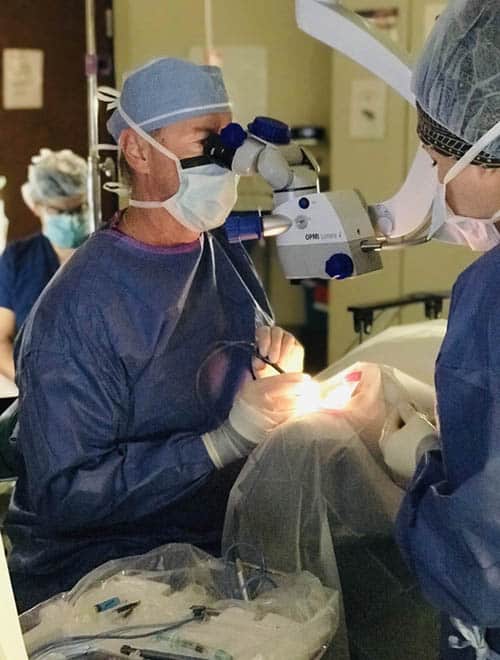Cataract Surgery
Get Your Clear Vision Back with Cataract Surgery in Flint, MI
Imagine looking through a foggy window, where the world appears hazy and unclear. If you’ve experienced this, you may be dealing with cataracts, a common eye condition that affects millions of people worldwide. Fortunately, at Michigan Vision in Flint, MI, our experienced cataract doctors can help diagnose and treat cataracts, restoring your clear vision and improving your quality of life. In this comprehensive guide, we will explore cataracts, their symptoms, causes, and treatment options, including cataract surgery.
Understanding Cataracts
A cataract is an eye condition characterized by the clouding of the natural lens inside the eye. This clouding occurs due to the clumping of proteins within the lens, resulting in a loss of transparency. As cataracts progress, they obstruct the passage of light into the eye, leading to a variety of visual disturbances.
Common symptoms of cataracts include:
- Blurry Vision: One of the earliest signs of cataracts is blurry vision, making it difficult to see objects clearly.
- Difficulty Seeing at Night: Cataracts can lead to decreased night vision, making driving and other nighttime activities challenging.
- Glare or Light Sensitivity: Individuals with cataracts often experience increased sensitivity to glare from headlights or bright sunlight.
- Halos or Starbursts Around Lights: Cataracts can cause light sources to appear as halos or starbursts, making them uncomfortable and distracting.
- Fading or Yellowing of Colors: Colors may appear less vibrant or yellowed due to the clouding of the lens.
- Double Vision: Cataracts can cause double vision or ghosting of images.
- Increased Need for Light: Individuals with cataracts may require more illumination for reading and other tasks.
- Glasses Not Working as Well: Frequent changes in prescription glasses or contact lenses may be necessary as cataracts progress.






Factors Contributing to Cataracts
Several risk factors can increase your chances of developing cataracts earlier in life. These include:
- Excessive Sunlight Exposure: Prolonged exposure to UV light from the sun without adequate protection can increase the risk of cataracts.
- Smoking: Smoking is a known risk factor for cataracts, and quitting smoking can help reduce this risk.
- Diabetes: People with diabetes are at a higher risk of developing cataracts due to changes in their eye’s lens caused by high blood sugar levels.
- Nearsightedness (Myopia): Individuals with myopia have a greater likelihood of developing cataracts.
- Eye Injuries: Trauma to the eye can accelerate the formation of cataracts.
- Steroid Medications: Long-term use of steroid medications, whether oral or topical, can contribute to cataract development.
Cataract Treatment Options
Cataracts can only be effectively treated with surgery. Fortunately, advancements in medical technology and surgical techniques have made cataract surgery one of the most commonly performed and safest procedures in the United States. Cataract surgery involves the removal of the clouded lens and its replacement with a clear artificial lens, known as an intraocular lens (IOL).

PanOptix Trifocal Intraocular Lens
We strive to be leaders in innovation and offer the most cutting-edge technology for our patients. The PanOptix Trifocal Lens is a once-in-a lifetime opportunity that opens up a million more. It’s the first and only trifocal cataract replacement lens in the U.S. that helps you achieve excellent vision with less dependence on glasses. The PanOptix Lens, now available at our office, provides an outstanding range of vision without blurry zones, so you can focus on the opportunities ahead.
Glasses After Cataract Surgery
One common question that patients often ask is whether they will still need to wear glasses after cataract surgery. The answer depends on various factors, including the type of IOL chosen and the individual’s vision needs. There are several options:
- Basic Cataract Surgery: Traditional cataract surgery improves vision but may still require corrective eyewear for the best clarity.
- Astigmatism Correction: Advanced technology such as the femtosecond LenSx laser system and toric lens implants can correct astigmatism, allowing patients to see exceptionally well at a distance without glasses.
- Range-of-Vision Correcting Lenses: Some patients opt for range-of-vision correcting lenses, which can enhance the functional range of their eyes, potentially reducing or eliminating the need for glasses in most daily tasks.
Frequently Asked Questions
Cataracts can significantly impact your vision and quality of life, but with advancements in medical technology and experienced cataract surgeons, clear vision is within reach. If you’re experiencing symptoms of cataracts, don’t hesitate to seek help from Michigan Vision in Flint, MI. Our dedicated team of professionals is here to diagnose, consult, and provide the necessary treatment, including cataract surgery, to help you regain your clear vision and get back to your normal life. Don’t let cataracts cloud your world! Schedule your consultation todayand take the first step toward a brighter, clearer future.

